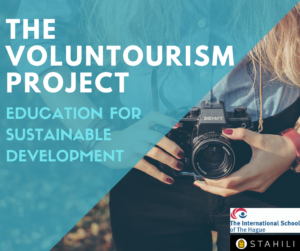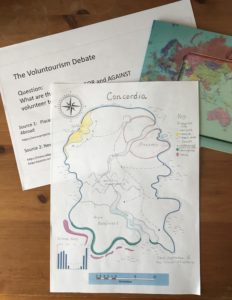Education for sustainable development: high school students reflect on voluntourism

The idea of combining volunteer work with tourism sounds, at first glance, like a “win-win” situation. You travel, you do good. Volunteer + tourism. What could possibly go wrong?
In partnership with teachers at the International School of The Hague (ISH), Stahili has piloted a two-week programme, the Voluntourism Project, for year 11 students (aged 15-16) in the Middle Years Programme (MYP) of the International Baccalaureate. The project gives students an opportunity to explore the concept of sustainability in tourism, and to reflect critically on the growing global trend of volunteer tourism. Is voluntourism sustainable? Can volunteer trips abroad be problematic – and even cause harm to the very people they are supposed to help – if the projects are not well managed and sustainable?
Education for Sustainable Development
Education is crucial for the achievement of sustainable development and to empower young people to take informed decisions and responsible actions to promote a more sustainable, just, equitable, and peaceful world.
Education for Sustainable Development (ESD) means ensuring that global challenges such as inequality, poverty and climate change are incorporated into teaching and learning in different areas across the curriculum. This approach means asking students to think critically about the underlying skills, attitudes and values necessary to shape sustainable futures. Schools and NGOs, including Stahili, are part of a global movement to develop educational approaches to encourage students of all ages to explore and engage with the Sustainable Development Goals.
ESD in action: understanding voluntourism in context
The Voluntourism Project, part of a longer module on sustainable tourism in the school’s MYP Geography curriculum, provides students with the opportunity to think critically about the issue of voluntourism through real-world inquiry.
Students first study the phenomenon of volunteer tourism as a global travel trend. They then take part in a debate set on an imaginary island whose economy depends on tourism and where there is a growing voluntourism industry, including projects working with children in orphanages. As with many countries experiencing an increase in voluntourism, international volunteer companies are bringing more visitors to the island’s less populated regions, boosting tourism, but at the same time threatening the social, economic and environmental fabric of communities.
Students play the roles of different interest groups with varying views and perspectives, such as the government tourism board, volunteer companies and voluntourists, community residents’ groups, labour unions and social workers, to debate the issue. The debate gives students an opportunity to look at all sides of the voluntourism phenomenon in the context of a developing country and ask: is voluntourism a sustainable form of tourism?
Student reflections
After taking part in the project and the debate, we asked students to reflect on what they had learned about voluntourism and sustainable development.
A number of students thought that volunteering abroad could potentially have a positive impact, but only if volunteers are qualified, well-trained and “able to deliver high quality services”. Most participants agreed that volunteers should not work with children in orphanages, noting that unwitting visitors “who may know know what is going on” can drive the separation of children from families. A constant stream of strangers working with young children and then leaving could also cause serious attachment problems, according to students.
Students critically reflected on charitable intentions and whether they are enough to justify going on a short-term volunteer trip. One student noted, “unfortunately, the vast majority of volunteer “opportunities” simply prey on the charitable intentions of individuals…through guilt.” At the same time, volunteers who go on expensive overseas trips simply to boost their CVs might gain more from volunteering in their home communities.
Students were in agreement that all volunteers, regardless of the project, should be properly screened and background checks carried out, and that volunteering for longer periods has more benefits than a short trip in a country which may be unfamiliar to the volunteer. All students highlighted the importance of community-driven projects which involve local people and NGOs, but there was also concern that poorly implemented projects in, for example, construction, could better be done by local people themselves. The very presence of volunteers in a community can influence its economy in a negative way if care is not taken to ensure that projects are rooted in local needs, well managed, and sustainable.
With thanks to teachers Bella Mandry, Suky Raju and Marian Cunnane, and the year 11 students of the International School of The Hague.
Are you a teacher and want to bring sustainable development into your classroom? Are you interested in exploring the topic of voluntourism with your students? Contact us at education@stahili.org.
